Realtors Kenny Klaus and Dan Noma on Thursday launched a new online certification program called “iReal Estate Pro Certification” designed to teach agents how to navigate, and profit from, the complicated labyrinth of iBuyers rapidly unfolding nationwide.
Based out of Phoenix — ground zero for iBuyers such as Opendoor, Offerpad and Zillow Offers — the agents told Inman this week that the course is similar to the so-called Certified Distressed Property Expert designation, which trains agents how to handle short sales. Instead, however, the new course arms enrollees with tools and tactics needed to ride the iBuyer train to success, Klaus said. The certification costs $499 while ongoing education is priced at $49 per month.
“If agents don’t get on board with consumer direct [iBuying] we’re going to speed that channel up for the iBuyers,” said Klaus, team leader of The Kenny Klaus Team at Keller Williams Integrity First Realty. “If we stay in between them, we’re still there to guide our client.”

Kenny Klaus
Among the lessons covered are lead generation and marketing, customer relationship management systems and scripts. Agent enrollees also receive a website template that captures prospective customers by inviting them to receive cash offers. It’s modeled off Klaus’ site, OfferDepot, which he’s used, with success, to draw new leads.
The idea behind the course is that agents shouldn’t feel the urge to tell consumers what the convenience and certainty of an iBuyer offer is worth, Noma said.
The cost of selling to an iBuyer can vary dramatically depending on the company. But Klaus estimates that, after factoring in an offer’s discounted off-market value, service fees ranging from 7 to 12 percent and repair costs, selling a home valued at $350,000 or less costs approximately $10,000 to $20,000 more than using an agent.
Selling to single-rental investors can be cheaper. That’s why the course also teaches agents how to collect direct bids from less-visible deep-pocketed buyers such as Blackstone’s Invitation Homes and FirstKey — institutions that also buy many homes from iBuyers, said Noma, a broker at Venture REI.
“We really are a disinterested third party and just a facilitator of information,” said Noma, who last year helped FirstKey buy more than 1,000 homes across Phoenix.
Noma advises agents to sign an “exclusive right to solicit offers agreement” with sellers, which would allow them to fetch bids from a variety of iBuyers and institutional investors — as many as 15 in Phoenix alone. Agents would then present sellers with the estimated proceeds the seller would receive by accepting each offer.
Additionally, agents are advised to throw in an estimate of what a homeowner would pocket if they sold with a traditional agent on the open market.
However, should the homeowner decide, for example, to sell to an iBuyer such as Opendoor, according to course guidelines the agent would then be advised to sign an “exclusive right to sell” agreement that stipulates the agent’s duty to represent the homeowner in the sale of their home to the iBuyer.
Klaus hopes that by teaching agents to play fair with iBuyers, venture capital-funded startups will “be part of helping guide this [the program] for the future.”
“Opendoor has their agent programs and who knows what the future is going to hold for these iBuyers with the amount of leads that they have,” he said.
iReal Estate Pro currently has no “formal hand-in-hand partnerships” with iBuyers or other institutional investors, Noma said.
Editor’s note: This story has been updated with reduced pricing for the iBuyer training program.













